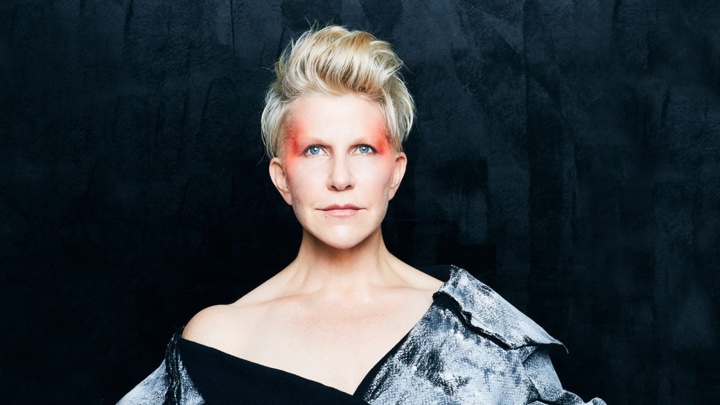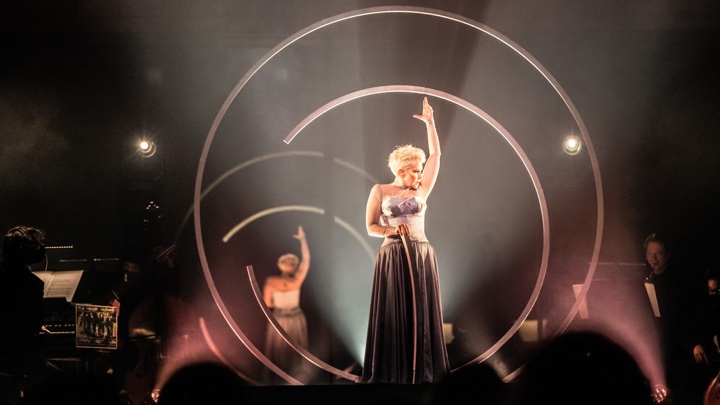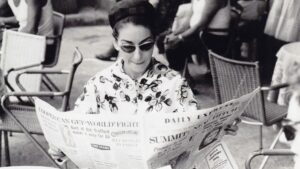
It is with this fascinating musical collage that Joyce DiDonato launches the program of her multimedia project Eden, which made its world tour’s 22nd stop on January 20 at Stanford University.
Joyce DiDonato’s Eden immerses listeners within a centuries-spanning musical meditation that channels the majesty of our natural world. The program’s thought-provoking selection centers on works that ponder about man’s relationship with the environment, featuring composers like the Baroque masters Gluck and Handel, modernists like Mahler, Copland, and Ives, and contemporary talents like Rachel Portman.
Apart from the program’s deliberate assemblage of scores with nature-centric motifs, DiDonato’s semi-theatrical Eden further rejuvenates the idea of a classical recital by including costumes, stage props, dramatic gestures, and projections. For this concert, Stanford’s amphitheater-shaped Bing auditorium proved to be a complementary canvas for lighting designer John Torres’ striking and colorful projections and director Marie Lambert-Le Bihan’s stage choreography.
The concert began with the remarkable period orchestra Il Pomo d’Oro floating The Unanswered Question’s shimmering strings into a darkened auditorium. DiDonato entered and walked the perimeter of the audience while replacing Ives’ questioning trumpet with haunting incantations–a mysterious and fitting prelude to the following song that represents the Eden project’s beating heart.
Portman’s The first morning of the world is a new commission that employs flowing woodwinds and shifting harmonies to evoke one’s yearning to understand the world’s origins through the language of the trees. Portman’s ravishing paean to nature’s sempiternal sentinels is uncanny for its thematic resemblance to Richard Powers’ monumental novel The Overstory, wherein the author animates its centuries-old, hundreds-feet tall protagonists by narrating their stories through a maze of fascinating human characters.
Incidentally, DiDonato will participate later this year in Tod Machover’s “Overstory Overture,” an excerpt of a yet to be completed opera based on Powers’ novel that will cast the mezzo soprano in the role of the ecologist Dr. Pat Westerford. In Portman’s song, Ms. DiDonato communicated her fascination and passion for the natural world poetically and intelligently, portending positive things for her future contributions to Machover’s new opera about the similar subject of nature and environmentalism.
The remainder of Eden’s 90-minute program proceeded as a loose chronological exploration of the program’s themes through four centuries of myriad composers and genres. Masterpieces of 20th century art song such as Mahler’s “Ich atmet’ einen Linden duft” and Copland’s “Nature, the gentlest mother” were liltingly sung between longer time voyages to the Italian baroque and classical compositions that are Ms. DiDonato’s specialty.

Among the earlier Italian works, Ms. DiDonato’s vibrant vocal palette, coloratura facility and dramatic acumen were deployed to greatest effect in Josef Mysliveçek’s “Toglierò le sponde al mare” from his oratorio Adamo ed Eva. In a later dramatic solo, she also thrilled audiences with her technical and interpretive bravado in the crackling aria “Ah! Non son io che parlo” from Gluck’s Ezio, with her silvery voice acquiring here a striking metallic quality that contrasted with the plangent colors she deployed in German lieder.
After this extended excursion through the baroque and classical repertory, Ms. DiDonato returned again to the twentieth century with a heartfelt rendition of Mahler’s “Ich bin der Welt abhanden gekommen” to close her Eden heroine’s journey by making peace with the world and achieving a sense of balance with nature.
In keeping with the project’s mission, Ms. DiDonato returned to the stage with the local youth choir iSing Silicon Valley to perform the original Eden piece “Seeds of Hope” (a staple of the tour’s concerts) and their spring anthem “Grow Little Tree”- a moving display of a major artist inspiring local choirs to participate in a global music project.
If the program’s eclectic musical arrangement at times appeared only tangential to its environmentalist intentions, perhaps Ms. DiDonato’s act of spreading Eden’s ecological ethos and sowing a seed of passion for music among these youth choirs advances the greatest part of her project’s admirable mission.






Comments